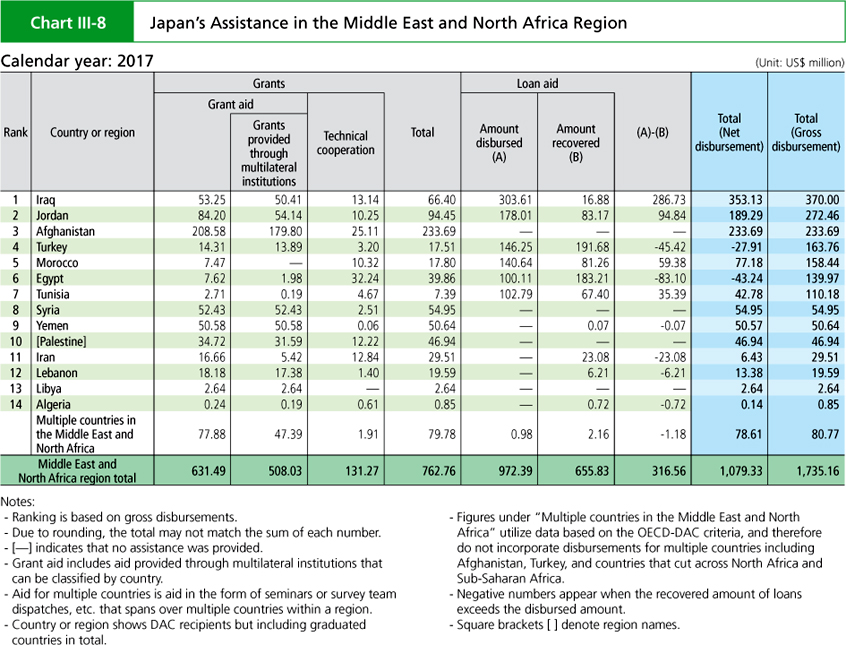7 Middle East and North Africa
The Middle East and North Africa region is a major supplier of energy resources, and accounts for approximately 50% of the world’s oil and natural gas reserves. In addition, Japan depends on this region for more than 80% of its crude oil imports, and the core maritime route for commerce between Japan and Europe pass through the region. Thus, this region is critical for Japan’s economy and energy security. Moreover, the Middle East and North Africa region has experienced major political upheaval since 2011, and the democratization process is proceeding in the countries where longstanding regimes have collapsed. Encouraging reform efforts in such countries through economic assistance and human resources development, etc. leads to peace and stability, not only in these neighboring countries, but also in the entire world.
On the other hand, this region is facing various challenges that destabilize the region, such as violent extremism including “Islamic State of Iraq and the Levant (ISIL),” a large number of refugees, the Syrian crisis, continued tension among the Gulf countries, tensions in the northern part of Iraq, issues on the Middle East Peace Process, and the domestic situations in Afghanistan, Yemen, and Libya. In 2014, ISIL unilaterally declared the establishment of a self-proclaimed “state” which extends across the national borders of Iraq and Syria. However, with the support from the Global Coalition to Counter ISIL led mainly by the United States, the Government of Iraq declared the liberation of the whole of Iraq from ISIL in December 2017, and the area controlled by ISIL has shrunk remarkably. Yet, it is still a significant challenge for the international community as a whole to continuously tackle the root causes behind the growth of violent extremism including ISIL.
Moreover, it is the feature of this region that there are many countries with large youth populations, and it is important to provide support to these countries so that they can continue to achieve stable growth. Realizing peace and stability in this region, which faces such issues, is extremely important for the international community as a whole including Japan, as it has significant impact on the stability and prosperity of the entire region as well as the international community. Therefore, there is a need for a united effort of the international community towards the realization of sustainable peace and stability, nation-building, and the reconstruction of these countries.
●Tunisia
The Quality and Productivity Improvement Project in Tunisia Phase 2
Technical Cooperation Project (January 2016 – December 2019)
Due to its conclusion of a partnership agreement with the EU, and subsequent progress in abolition of tariff barriers, Tunisia is striving to establish and strengthen its industrial competitiveness in the international market. Above all, the Tunisian government is focusing on improving its domestic industry, which can potentially contribute to job creation, as an important agenda, particularly through enhancing the quality and productivity of small and medium-sized enterprises.
“The Quality and Productivity Improvement Project in Tunisia Phase 2” implemented by Japan since 2016 has been supporting efforts such as the continuous training of human resources as consultants for the dissemination of quality and productivity improvement activities (“Kaizen”).
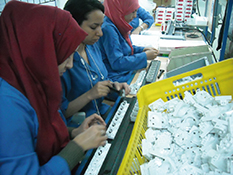
A small and medium-sized enterprise in Tunisia that increased productivity by introducing Kaizen (Photo: Ikeda Expert of Kaizen Project)
The Japanese-style Kaizen methods are characterized by efforts to try to resolve challenges through enhanced teamwork centered around the personnel working on site, while increasing the quality of work through measures including the so-called “5S” (Sort, Set, Shine, Standardize, and Sustain) and visualization, and reviewing safety and work efficiency. The results of Kaizen go beyond raising quality and productivity, and thereby increasing company profit, but can also help build win-win relationships between managers and employees, for example, by increasing motivation among personnel working on site through having them propose Kaizen themselves.
First of all, in this project, Japanese experts trained 23 Tunisians as Kaizen Master Trainers. Those 23 Master Trainers then served as consultants for the various technology centers in the fields of machinery, electrics and electronics, chemistry, and textiles under the jurisdiction of the Ministry of Industry, Small and Medium-sized Enterprises. To date, they have guided 56 companies in on-site Kaizen, targeting approximately six model companies in each field. Furthermore, the Master Trainers are training new consultants together with the experts from Japan. One small and medium-sized enterprise in the electronic components sector which actually introduced Kaizen saw its productivity rise from 30% to 60%, which led to the establishment of new production lines and business expansion.
Through this project, Japan will continuously support the training of human resources who will be responsible for sustainable industrial development and promotion of domestic industry, and contribute to strengthening the industrial competitiveness and economic growth of Tunisia.
■Japan’s Efforts
●Support for Syria, Iraq, and the neighboring countries
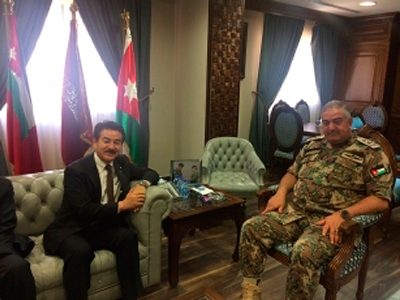
In July 2018, State Minister for Foreign Affairs Sato made a visit to Jordan, and exchanged opinions with Lt. Gen. Freihat, Chairman of Joint Chiefs of Staff of Jordan, mainly on the situation in Syria, and explained that Japan intends to continue providing assistance, including assistance for refugees.
With regard to the Syria issue, which is a pressing concern for the international community, Japan announced the provision of assistance totaling approximately $260 million, at the Conference on Supporting the Future of Syria and the Region (Brussels Conference) held in Brussels in April 2017, and swiftly carried out the assistance. In addition, from the perspective of responding to the humanitarian crisis, counter-terrorism measures, and social stabilization to prevent the emergence of new extremism ideology, Foreign Minister Kono announced an additional support of approximately $220 million, including support for Syria and the neighboring countries, at the Brussels II Conference in April 2018. In view of the urgency of the situation, the assistance was implemented swiftly. This assistance includes support for displaced persons and the recovery of power supplies, as well as the human resources development of youths and the empowerment of women. Furthermore, Japan decided in April 2018 to provide approximately $14 million in assistance toward Syria, including the East Ghouta district on the outskirts of the capital Damascus, where the situation has worsened rapidly, as well as for assistance toward refugees of Jordan and Lebanon in the areas of healthcare and food. In 2018, Japan also provided support for the procurement of equipment and other supplies, in the area of waste treatment to Jordan, where the burden on administrative services increased as a result of the influx of Syrian refugees. Since the outbreak of the Syrian crisis in 2011, Japan’s assistance to Syria, Iraq, and the neighboring countries has reached approximately $2.5 billion. In these ways, Japan provides timely and effective assistance to the region despite the ever-changing humanitarian landscape (See also (1) Support for Peacebuilding and Refugees/Displaced Persons).
Japan also provides support for human resources development and self-reliance of refugees. At the G7 Ise-Shima Summit held in 2016, Japan announced that it would provide comprehensive assistance totaling approximately $6 billion for the Middle East in the three years between 2016 and 2018, including human resources development programs for approximately 20,000 people, in order to build a “tolerant and stable society” in the region. This assistance is being steadily implemented. As a part of this support, Japan decided to accept up to 150 Syrian students over five years to provide opportunities of education and foster human resources to contribute to Syria’s recovery in the future. In 2018, Japan accepted 29 Syrian students. Furthermore, as a provision of humanitarian and self-reliance assistance to refugees (including education and vocational training), and assistance to host countries, Japan also provided an assistance package of approximately $2.8 billion over three years, as announced by Prime Minister Abe at the United Nations Summit for Refugees and Migrants held at the United Nations General Assembly in 2016.
●Assistance to Afghanistan
Japan has consistently provided assistance to Afghanistan, and since 2001, Japan’s assistance to Afghanistan totals approximately $6.6 billion (as of December 2018). Japan, as one of the major donor countries for Afghanistan, has also been endeavoring to coordinate its assistance with the government of Afghanistan and other donors such as the G7, UN organizations, and the World Bank. In order to support Afghanistan’s efforts towards self-reliance and stability, Japan’s current priorities in assistance are in the security field of capacity building of the police force and in the development fields of agricultural development, human resources development, and infrastructure development.
In 2012, Japan and Afghanistan jointly held the Tokyo Conference on Afghanistan. The conference, attended by representatives of around 80 countries and international organizations, issued an outcome document titled the “Tokyo Declaration.” At the conference, the Tokyo Mutual Accountability Framework (TMAF) was established to clarify the mutual commitment between Afghanistan and the international community for the sustainable development of Afghanistan, and to regularly monitor and review the commitment. This framework of mutual accountability has been succeeded by the Geneva Mutual Accountability Framework (GMAF), adopted in November 2018 at the Ministerial meeting of the Geneva Conference on Afghanistan.
●Middle East Peace (Assistance to Palestine)
Japan has positioned its assistance to Palestine as one of the important pillars of its measures to contribute to the Middle East Peace Process, and has provided more than approximately $1.9 billion in assistance to Palestine since the 1993 Oslo Accords. Specifically, Japan provides various types of humanitarian assistance through international organizations and NGOs to improve the severe living conditions of the socially vulnerable people in the West Bank (including East Jerusalem), people affected by conflicts in the Gaza Strip, and others. Japan is also engaged in efforts aimed at preparing for the Palestinian nation-building in the future and for a self-sustained Palestinian economy, in order to stabilize and improve the people’s lives, strengthen the financial foundation, enhance the administrative and financial capacity, and promote economic self-reliance.
Since 2006, Japan has launched the initiative of the “Corridor for Peace and Prosperity” as its unique medium to long-term initiative that aims to promote socio-economic development in the Jordan Valley area through regional cooperation among Japan, Israel, Palestine, and Jordan, and is implementing the development of the Jericho Agro Industrial Park (JAIP) as the flagship project of the initiative. In May 2018, Prime Minister Abe visited JAIP on his visit to Palestine, and received a briefing on the current conditions from Prime Minister Hamdallah of Palestine. At the same time, he also toured the exhibition booths set up by tenants operating in JAIP (of the 37 companies that have concluded tenancy contracts, 12 are in operation) and listened to their explanations, as well as sampled juice, nuts, and other products produced at JAIP.
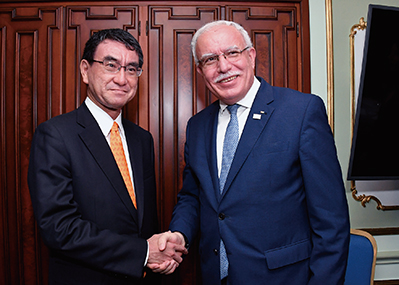
Foreign Minister Taro Kono, who met with H.E. Dr. Riad Malki, Minister of Foreign Affairs and Expatriate of Palestine in November 2018
Furthermore, in 2013, Japan launched a new initiative called the “Conference on Cooperation among East Asian Countries for Palestinian Development (CEAPAD)” to help Palestine achieve economic independence by drawing on Asia’s experience on human resources development and corporate economic development. To date, meetings have been held on triangular cooperation for human resources development (See “South-South cooperation” under glossary) and on trade and investment expansion. Moreover, through these meetings, Japan plays an important role, such as by encouraging more countries to provide support for the United Nations Relief and Works Agency for Palestine Refugees in the Near East (UNRWA), which is responsible for assisting Palestinian refugees.
Furthermore, in November 2018, Foreign Minister Kono conveyed Japan’s intention to continue supporting Palestine through JAIP and CEAPAD in his meeting with Dr. Riad Malki, Palestinian Minister of Foreign Affairs and Expatriates. He also proposed holding CEAPAD-related meetings in Palestine. In response, Dr. Malki expressed his gratitude for Japan’s unique initiatives to assist Palestine, such as the Corridor for Peace and Prosperity and CEAPAD, and welcomed the proposal to hold the said meetings in Palestine. Japan has steadily implemented such assistance, and in cooperation with the international community, will continue to provide support for social stabilization and inclusive growth, not only from the perspective of humanitarian assistance, but also a medium to long-term view. This includes assistance in human resources development that leverages on Japan’s strengths.
●Turkey
Bosphorus Rail Tube Crossing Project
Loan Aid (August 1999 – December 2019)
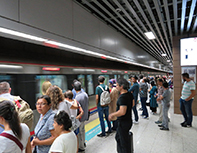
Passengers waiting for Marmaray
Istanbul is the largest city in Turkey with a population that currently exceeds 15 million, and is continuously growing. The Bosphorus Strait divides the city into an Asian side and a European side, but the two bridges at the time that link the mainly residential Asian side and the commercial European side were suffering chronic traffic congestion and growing problems related to air pollution due to exhaust gases at times of congestion, and energy wastage. Therefore, a plan was established to build a subway system across the Bosphorus Strait, to serve as a means of transportation with low environmental impact, in response to the growing transport demand in the city, and this plan has been implemented since 1999 with the support from Japan.
This project required advanced technology to lay an immersed tube*1 60 meters in the seabed, the world’s deepest, due to the strict conditions imposed by the numerous ships in the Bosphorus Strait, as well as its fast and complex tides. A careful approach was also demanded, due to the necessity to consider buried cultural property, specific to this historical city, when constructing the underground stations. In fact, almost a year was needed to gather data on the flow of the strait and its speed, and various difficulties were encountered, such as the excavation of many historical ruins, which led to the suspension of construction works each time. However, thanks to the advanced technology of Japanese companies, the Bosphorus Rail Tube Crossing (commonly known as “Marmaray”*2 ) was opened in October 2013. As a result, the time to cross the strait was shortened to 4 minutes from 30 minutes.
The opening ceremony of Marmaray was held on October 29, 2013, the 90th anniversary of the founding of Turkey. The opening of Marmaray was celebrated greatly as a bridge of the new friendship between the two countries, as attendees included Prime Minister Abe from the Japanese side and then Prime Minister Erdogan from the Turkish side. Moreover, since the concept of constructing a tunnel beneath the Bosphorus Strait is said to be proposed by Sultan Abdülmecid I in 1860 for the first time, a commemorative stamp was issued in the country on the same day of the opening ceremony, with a design showing Marmaray and a conceptual design worked out in 1860, as a symbol of the realization of this 150-year dream of the Turkish people, through this project.
Under this project, Japan continues to support part of the improvements being made to the existing rail network as well, other than Marmaray, even after October 2013. When the work is completed, there will be a very long railway connecting Europe and Central Asia. Since Marmaray was also created under the assumption that it would serve as a freight railway for the transportation of oil and gas, it is expected to play an important role in the future, as a major artery not only for transporting people, but also for the distribution of goods, as part of the international railway network.
*1 A construction method where a box-shaped structure called a section is built, carried by ship and sunken to the ocean floor. Eleven sections were constructed and put into place under this project.
*2 Marmaray is a hybrid word that combines Marmara, a sea to the south of the construction zone of this project, and ray, which means railway in Turkish.
![[Japan’s international cooperation policy] Priority issues in the Middle East and North Africa Region](imgs/p099_1.jpg)
